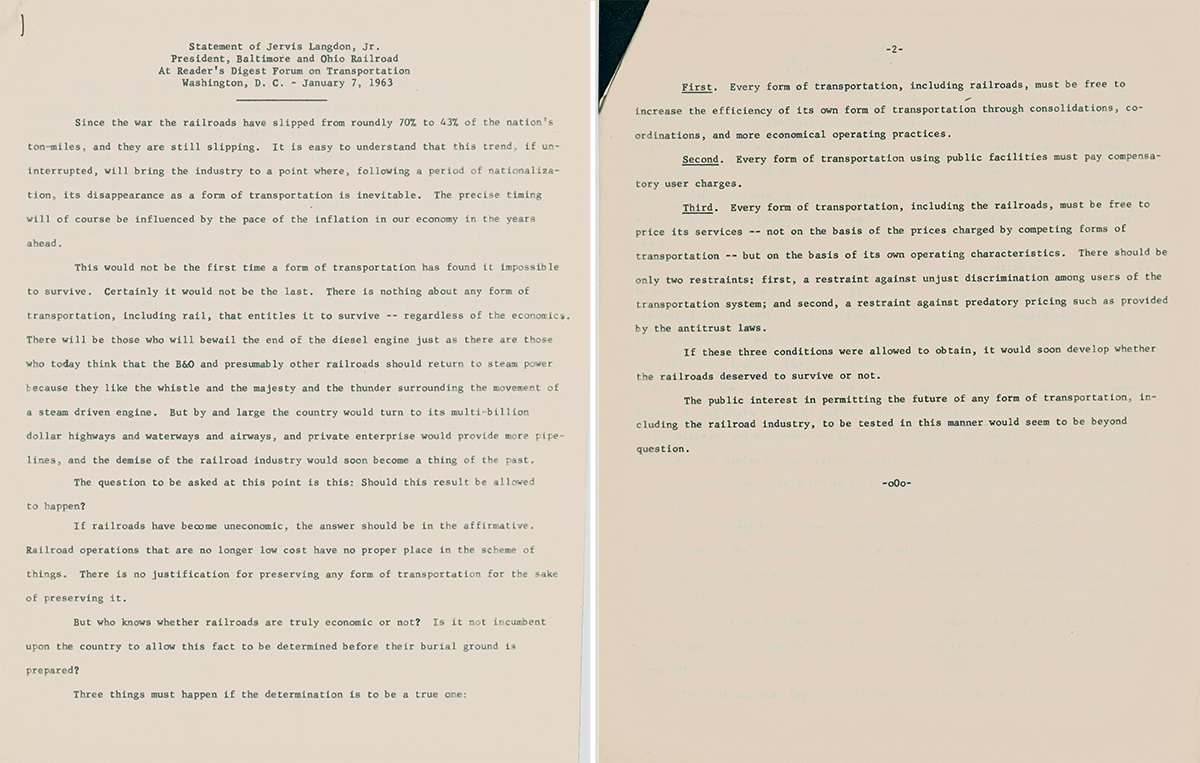Jervis Langdon (1905-2004) was a major figure in the U.S. railroad industry during the third quarter of the twentieth century, a time when it was beset by major difficulties that included loss of traffic, especially passengers, to other transportation modes and ossified government regulation. Working within these constraints, Langdon gained a reputation as an innovator and a “doctor” of weak or ailing railroads.
Langdon was a member of the fourth generation of a family of Elmira, New York, industrialists with ties to the railroad industry. His grandfather was the friend and brother-in-law of Mark Twain, and his uncle was a railroad president who steered him into the legal profession and gave him a start in the business.
As a lawyer, Langdon mastered the art of arguing rate cases before the Interstate Commerce Commission. His career took off when he was chosen to head the troubled Baltimore and Ohio Railroad in 1961. With his legal and rate-making background, he brought a new emphasis on customer service and modern office practices that turned the company around.
In 1964, Langdon moved to the Chicago, Rock Island and Pacific, an even more troubled railroad on the Great Plains. Four years later, the Pennsylvania Railroad and the New York Central Railroad merged creating the Penn Central Transportation Company.

In 1969 the hopelessly bankrupt New York, New Haven and Hartford was added, and the next year, the whole enterprise crashed in bankruptcy. Langdon was the government’s obvious choice for one of the bankruptcy trustees. He was the railroad man who would try to make a viable company out of the wreck of Penn Central.
After two other presidents failed, Langdon was made CEO instead. He kept the railroad running while the courts heard arguments for reorganization, but his reports confirmed that only massive government action could turn things around, leading to the formation of federally controlled Amtrak and Conrail. He retired on the day Conrail went into operation.
The records collected by Mr. Langdon document his efforts to reform national policy regarding competitive rates for transporting goods by railroads, the trucking industry and water carriers. Court hearings, sessions of the U.S. Senate and House of Representatives, as well as Interstate Commerce Commission records describe the complexities of maintaining fair shipping rates among commercial carriers. Langdon's analysis of ICC regulations and the impact on transportation are discussed in detail in his papers. Speeches, court depositions and appearances before the ICC provide clear, concise arguments in favor of maintaining rail service with less restrictive regulations on railroads and other freight and passenger carriers.
Additional information regarding Jervis Langdon, Jr. and his papers can be found in Hagley Manuscripts and Archives Accession No. 2068. The Published Collections Department holds a number of railroad-themed books and government reports from Mr. Langdon’s personal library. For additional information, contact askhagley@hagley.org.
David H. Burdash is a Processing Archivist at Hagley Museum and Library.
